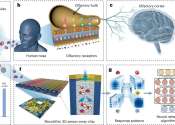Bionic jellyfish swim faster and more efficiently
Engineers at Caltech and Stanford University have developed a tiny prosthetic that enables jellyfish to swim faster and more efficiently than they normally do, without stressing the animals. The researchers behind the project ...
Jan 29, 2020
1
368









